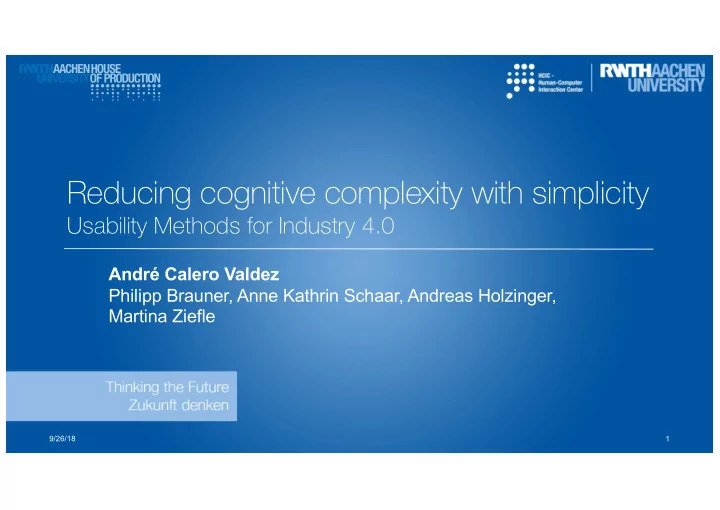

Reducing cognitive complexity with simplicity Usability Methods for Industry 4.0 André Calero Valdez Philipp Brauner, Anne Kathrin Schaar, Andreas Holzinger, Martina Ziefle 9/26/18 1
Industry 4.0 Challenges Transition in engineering work § Self-optimizing, individualized, integrated processes § Regulatory and monitoring tasks Challenges in § Dealing with complexity § Managing knowledge § Sharing responsibility 9/26/18 2
Industry 4.0 Challenges Transition in engineering work § Self-optimizing, individualized, integrated processes § Regulatory and monitoring tasks Challenges in § Dealing with complexity § Managing knowledge § Sharing responsibility 9/26/18 3
Forms of complexity Perceptual complexity § Gestalt theory, homogeneity, simplicity, information entropy, form complexity, visual chunking, pop-out, etc. Task-complexity § Multi-variate decision making, goal complexity, input complexity, process/training, time, presentation, etc. Cognitive complexity § Relational knowledge (t,s,b), planning tasks, categorization, narrativity, uncertainty 9/26/18 4
Forms of complexity Perceptual complexity § Gestalt theory § homogeneity, simplicity § information entropy § form complexity § visual chunking § pop-out, etc. 9/26/18 5
Forms of complexity Perceptual complexity § Gestalt theory § homogeneity, simplicity § information entropy § form complexity § visual chunking § pop-out, etc. 9/26/18 6
Forms of complexity Perceptual complexity § Gestalt theory § homogeneity, simplicity § information entropy § form complexity § visual chunking § pop-out, etc. 9/26/18 7
Forms of complexity Task-complexity § multi-variate decision making § goal complexity § input complexity § process/training § time (duration, pressure) § presentation, etc. 9/26/18 8
Forms of complexity Cognitive complexity § relational knowledge - transitiviy, symmetry, binary § planning tasks § categorization § narrativity § uncertainty § etc. 9/26/18 9
Use-Cases Visualization of complex data (ERP) § Monitoring tasks, multivariate tasks § Decision-Support => Consequences Simulation and scientific visualization § Burden of knowledge § High-dimensional data Implications for UI Design Processs Associated Costs? 9/26/18 10
Experimental setup Stock Production Due in Demand 12 3 0 4 15 9 1 22 11 1 9 12 17 8 2 39 9/26/18 11
Experimental setup n Controlled experiment in Supply Chain context n Independent variables – Task complexity (within subj.) – Information Amount (within subj.) – Presentation format / Usability (between subj.) n Explanatory variables: – Age, Gender, Experience n Dependent variables – Performance (time in ms) – Correctness (correct / no correct) – Instruction: Correctness n Order necessary in ANY for any of the lines? (Y/N) 9/26/18 12
Results: 3-way Interaction Poor usability especially pricy in complex environments 25000 25000 20000 20000 Reaction time [ms] Reaction time [ms] 15000 15000 simple simple 10000 10000 medium medium difficult difficult 5000 5000 0 0 short (4 lines) long (8 lines) short (4 lines) long (8 lines) Table length Table length 9/26/18 13
Designing Methods Qualitive Findings from Interviews 9/26/18 14
Summary & Contact Different forms of complexity § Visual, Cognitive, Task-based Complexity reduction § Dimension reduction, pattern detection, interaction design, natural mapping Usability methods § Scenario-based/Use Cases § Paper-Prototyping André Calero Valdez § calero-valdez@comm.rwth-aachen.de § 0241 – 80 239480 9/26/18 15
Recommend
More recommend